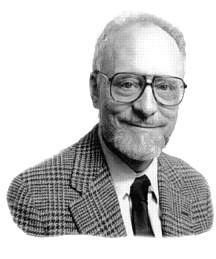
In 1964, Dr. Berlekamp joined the faculty of the University of California at Berkeley as Assistant Professor of Electrical Engineering. He joined the staff at Bell Telephone Laboratories Mathematics Research Center in Murray Hill, New Jersey in 1967 and, in 1971, returned to the U.C. Berkeley as Professor of Mathematics and of Electrical Engineering/Computer Science.
 |
Under Dr. Berlekamp's leadership, Cyclotomics designed and developed a variety of innovative electronic subsystems and full-custom integrated circuits that implement novel algorithms for error-correcting codes, deskewing, and synch acquisition for aerospace and commercial applications. In 1984, Cyclotomics "Bit-Serial" Reed-Solomon encoders were formally adopted as the NASA standard for deep space communications. NASA's Voyager communication system, for example, which reached Neptune in August, 1989, uses a Reed-Solomon code with Berlekamp decoding. On the commercial side, all compact disk players use R-S Codes with Berlekamp decoding.
Other data systems and programs that Cyclotomics' coding technology either made possible or improved include: the joint tactical information data system (JTIDS) of the three military services, a data storage system for the Library of Congress, telephone facsimile systems, and recently the laser-read and magneto-write very-high-density optical storage systems. Cyclotomics pioneered new formatting, synchronization, and error-correcting algorithms for recording digital information on film. This technology has brought sophisticated error-correction, cryptography, and data compression to the image work station.
Elwyn Berlekamp has authored over 75 publications, including his seminal landmark book, "Algebraic Coding Theory" (McGraw-Hill, 1968; Aegean Park Press, 1984), which is still the standard work in the field and is considered an indispensable "bible" for engineers in the field, in academia, and industry. He is the co-author of "Winning Ways" a two-volume treatise on the combinatorial theory of two-person perfect information games. He has been awarded four patents and has a number of other inventions in various stages of the patent process. Dr. Berlekamp is a fellow of the IEEE (1972) and was President of the IEEE Information Theory group in 1973. He was elected to the National Academy of Engineering in 1977.
Dr. Berlekamp's current technical interests are the use of statistical information theory to forecast stock and commodity prices, and recent extensions of game theory which provide precise analyses of certain different endgame problems in the Oriental board game, "Go."
Dr. Berlekamp and his wife Jennifer reside in Piedmont, California. They have three children: Persis, 21; Bronwen, 16; and David, 7. He has enjoyed the art of juggling since the age of 10.
In addition, Dr. Berlekamp's company owes Sam Sloan $3,316 in royalties for Sloan's book, entitled "Chinese Chess for Beginners."'
[Sincere thanks are due to Hartland Snyder, who, on July 7, 1995, provided the above information about Professor Elwyn R. Berlekamp to Judge John Flaherty of the Santa Clara County, California Superior Court.]